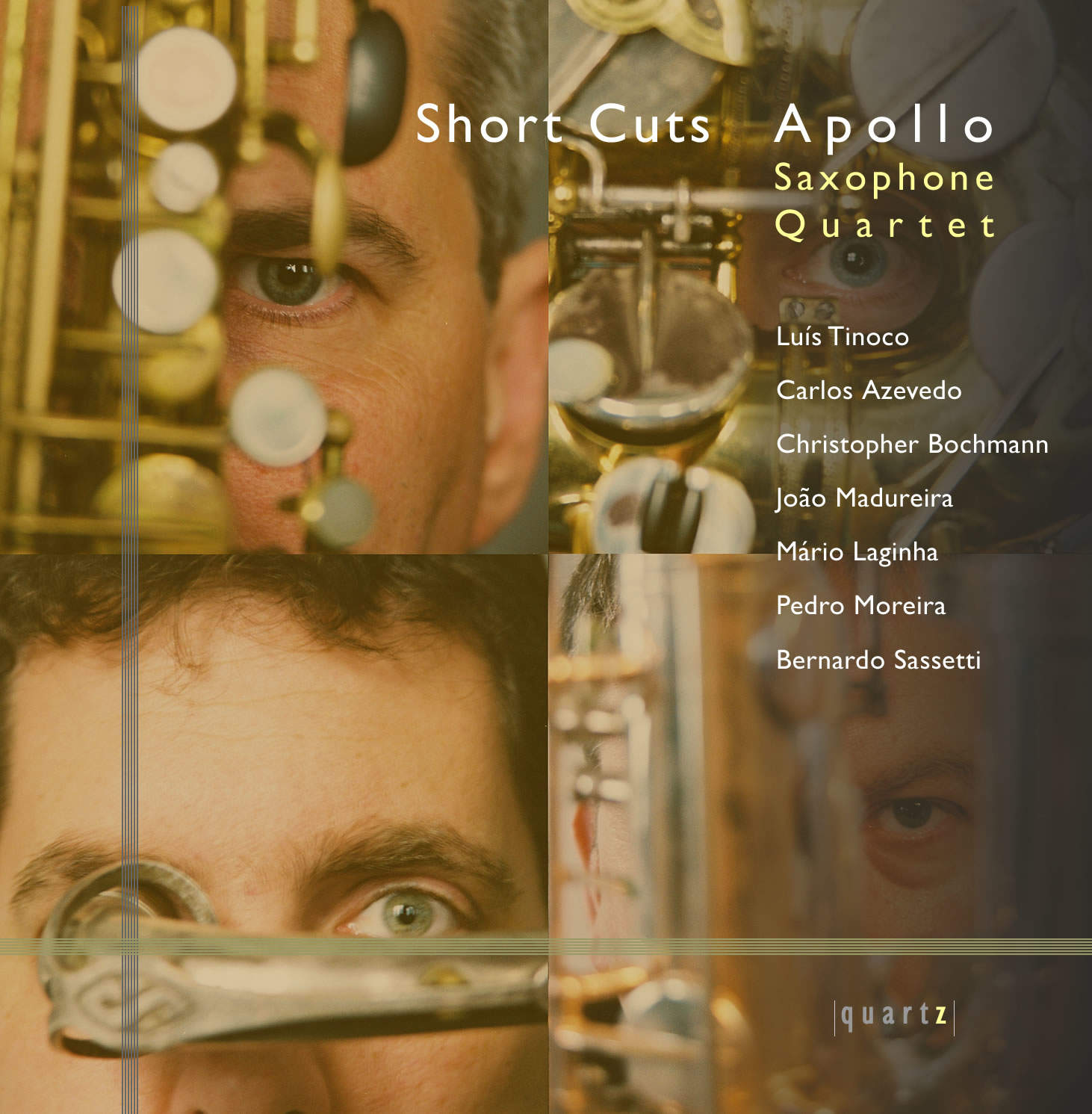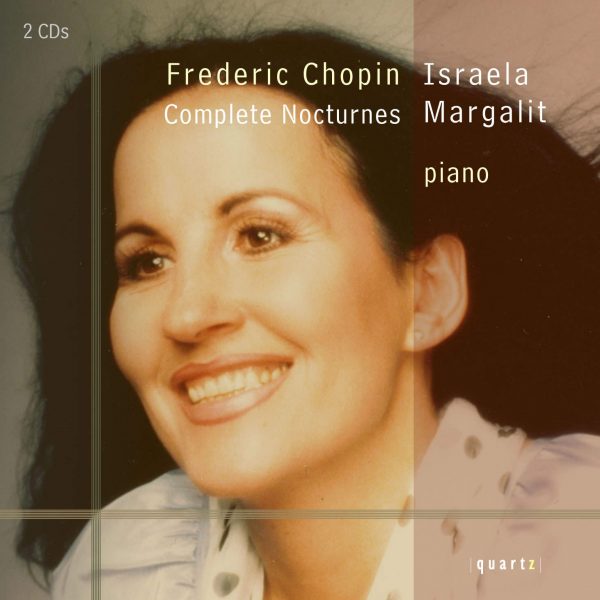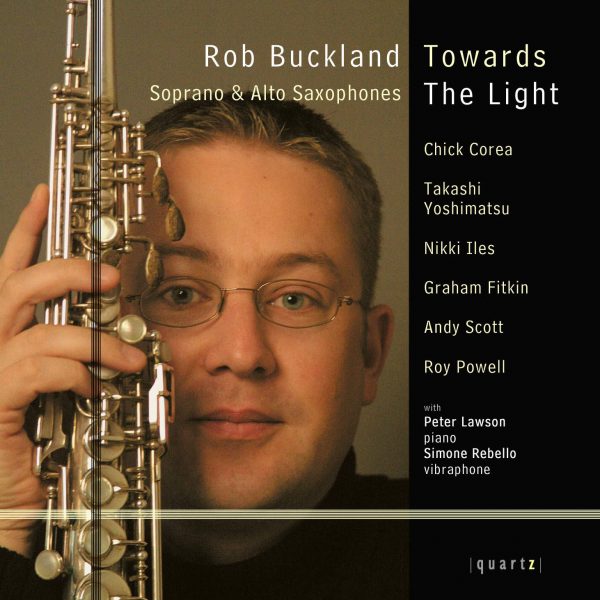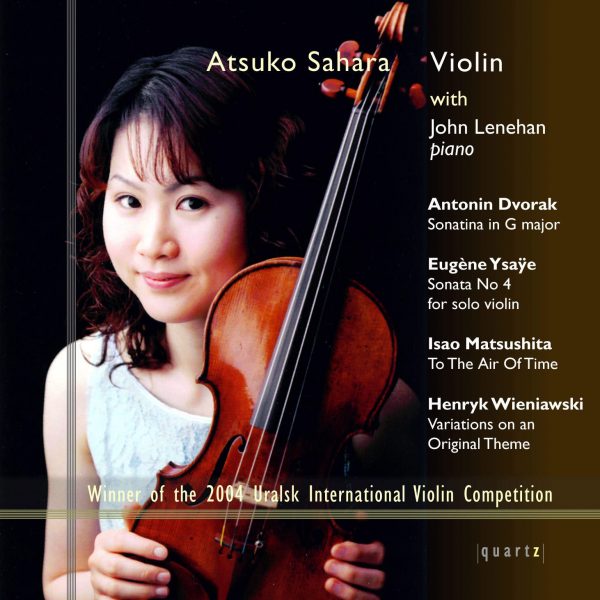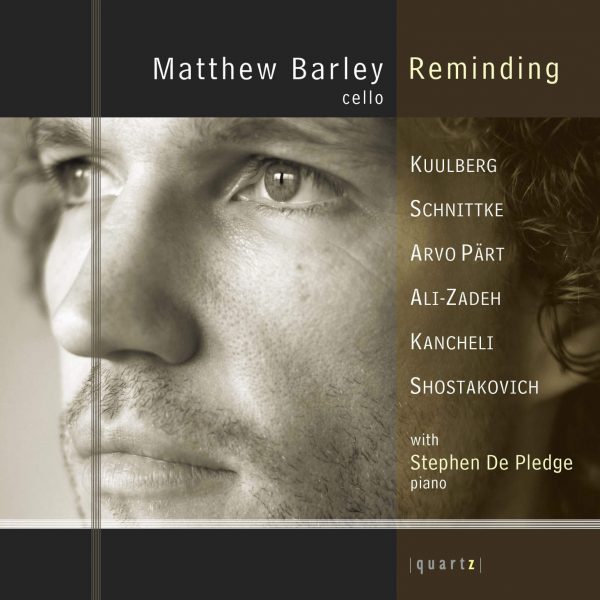Short Cuts
Price range: £4.99 through £11.99
Luis Tinoco – Short Cuts
Carlos Azevedo – Sunflower
Christopher Bochmann – Movements
Joao Madureira – Loop
Mario Laginha – Is this a Fugue?
Christopher Bochmann – Essay XIII
Pedro Moreira – 12 Tones in a Row
Christopher Bochmann – Lampoons
Pedro Moreira – Lola Bye
Bernardo Sassetti – Smoking Aria
The Apollo Saxophone Quartet’s vibrant and energetic exploration of portugese music is full of unexpected treasures. Encompassing a kaleidoscopic range of styles, including classical, rock, post-minimalist, jazz and experimental influences, this is one of the most colourful discs to be recently released on Quartz.
About This Recording
Luis Tinoco – Short Cuts
(Commissioned with funds made available by The Arts Council of England North West)
My main purpose is to play with two possible meanings for “short cuts”. That is, both with the idea of sharp and cutting musical gestures and the idea of taking a different, shorter, path to reach a specific destination. LuisTinoco
Luis Tinoco (b.1969, Lisbon) attained his First Degree in composition at the Escola Superior de M? de Lisboa where he studied under Ant󮩯 Pinho Vargas and Christopher Bochmann. He was then awarded scholarships by the Centro Nacional de Cultura and, later on, by the Calouste Gulbenkian Foundation to complete a Masters degree in composition at the Royal Academy of Music in London, where he studied with Paul Patterson. Tinoco lectures in Composition and Analysis at the Escola Superior de M. de Lisboa. He wrote and presented A Century’s Score – a 20th / 21st century music program for the RDP-Portuguese Radio Broadcast – from 2000 to 2003, and he is now the author of a new program, The Sound’s Geography. He is also a founder and member of the Artistic Direction for the contemporary music ensemble OrchestrUtopica.
Carlos Azevedo – Sun Flower
The title “Sun Flower” is purely descriptive. My goal was to create ambiences that could be related to light and shadow, by using light and dark sonorities. The contrast between faster and slower gestures creates an idea of gradual movement from darkness to luminosity. In the sunflower’s search for light, the piece derives a sense of purpose and drama. Carlos Azevedo
Carlos Azevedo (b.1964, Vila Real) studied composition at the Escola Superior de M. e Artes do Espectaculo in Porto and with George Nicholson at Sheffield University, where he received his MPhil in composition. Since 1997, Azevedo has been active as composer, conductor and pianist for the Matosinhos Jazz Orchestra. He is also leader of the Carlos Azevedo Ensemble and, as a jazz pianist, he has performed all over Portugal. His work In Motion was played by the Porto Symphony Orchestra in honour of Porto being the European Cultural Capital for 2001. He is currently a teacher of Analysis at the Escola Superior de Me Artes do Espectaculo in Porto.
Christopher Bochmann – Movements
Each movement is little more than a miniature. One, three, four and seven provide the backbone to the work: their duration is controlled and they define the underlying direction that moves from an immovable sustained music to a frenetically mobile music. The first movement is an introduction, a presentation of the germ-material. The second is an Alto solo, outlining many of the possible implications of this material. The third and fourth are of an almost canonic rigour. The fifth explores certain consonances that emerge from the material. The sixth provides a link between the fifth and seventh: it is improvisational in spirit but prepares the freneticism of the final movement. Christopher Bochmann
Christopher Bochmann (b.1950, Chipping Norton) was a chorister at St. George’s Chapel, Windsor Castle, and then went on to Radley College. He studied privately with Nadia Boulanger in Paris before going up to New College, Oxford, where he worked with David Lumsden, Kenneth Leighton and Robert Sherlaw Johnson. He was also a pupil of Sir Richard Rodney Bennett in London. Bochmann has taught in Britain and in Brazil, and since 1980 has lived and worked in Lisbon, Portugal. He is Head of Composition at the Escola Superior de M de Lisboa, of which he was also Director from 1995 to 2001. In 2003, he published the first treatise on Harmony in the Portuguese language for over fifty years (A Linguagem Harmónia do Tonalismo). As a composer he has won a number of prizes including the Lili Boulanger Award (twice) and the Clements Memorial Prize. In 1999, he received the degree of Doctor of Music from Oxford University.
Joao Madureira – Loop
Loop, is the name of a small sax quartet based on a constantly shifting harmonic puzzle, giving the impression of a never ending process – which comes suddenly to an end. Joao Madureira
Joao Madureira (b.1971, Lisbon) graduated in Composition Studies at the Escola Superior de Musica de Lisboa in 1994, where his composition masters were António Pinho Vargas and Christopher Bochmann. In 1995 Madureira attended Franco Donatoni’s classes in Siena and between 1997 and 2000 he graduated in Composition at the Hochschule fur Musik? where he studied with York Holler. Finally, he studied with Ivan Fedele at the Conservatoire Nationale de Musique de Strassbourg until June 2003. Between 1998 and 2000 he benefited from a scholarship granted by the Centro Nacional de Cultura in Lisbon. In October 1998 Madureira’s work Poem? was awarded the ACARTE / Maria Madalena Azeredo Perdig Prize, of the Gulbenkian Foundation. In 2003 he was invited to be composer-in-residence at the OrchestrUtopica. Joao Madureira teaches Composition Graduation Courses at both the Escola Superior de M? de Lisboa and the Escola Superior de Musica e Artes do Espectaculo do Porto.
Mario Laginha – Is this a Fugue?
Is this a fugue? Yes, it is.
Actually, it’s the result of a great attraction that I have for this technique. As in other fugues I have written, I have tried to place this one in a musical universe that flirts with jazz but doesn’t pretend to be jazz. Mario Laginha
Mario Laginha (b. 1960 Lisbon) studied classical music at the National Conservatory where his teachers included Jorge Moyano and Carla Seixas and subsequently received the Bach and the Teresa Vieira Awards. Jazz, however, has been always his main love. He has played with musicians such as Julian Arguelles, Wayne Shorter, Ralph Towner, Dino Saluzzi, Manu Katch, Django Bates, Bernardo Sassetti, Pedro Burmester and Trilok Gurtu. As a composer and musician Laginha has been very closely linked to singer Maria Joao together they have made eight albums and have played in Europe, America, Asia and Africa. Over the past 10 years Mario Laginha has written for the Metropolitan Lisbon Orchestra, N.D.R Hamburg Big Band, Drumming, Remix Ensemble, Porto Symphonic Orchestra, and has recorded twelve albums.
Christopher Bochmann – Essay XIII (Rob Buckland – solo alto saxophone)
The first part is a sort of Moto Perpetuo based on a 7-note figure, with a lot of timbre trills. It reaches its climax with a sequence of multiphonics. The second part provides a contrast, with its long expressive cantabile sounds. This central part can be seen to be divided in four sections: the first sings in a middle register; the second hovers around a low E; the third explores the instrument?s high register; the fourth returns to the atmosphere of the first. The third and last part is a free development of all the musical material heard in the first two parts. There is no recapitulation as such although there are clear references to the material of the opening music. Christopher Bochmann
Pedro Moreira – 12 Tones in a Row
12 Tones in a Row is a short piece using basic serial procedures. The various melodic forms are intended to be very easily recognizable. There are several improvised sections. In these improvisations the resulting sonority still consists of 12 note aggregates. Like other forms of “harmonic” improvisation, the challenge is to find a place somewhere between freedom and restriction. After the introduction, more lyrical in character, the piece has a relaxed, playful feeling. Like a child playing with notes. In this case, 12 notes. Pedro Moreira
Pedro Moreira (b.1969, Lisbon). In 1985 Pedro Moreira performed extensively in Portugal’s Jazz festivals and also toured the United States, Paris, Barcelona, Madrid, Mozambique, South Africa and the Ivory Coast. With his band he recorded Luandando (Movieplay), with Freddie Hubbard. He has also studied classical saxophone, theory and acoustics at the Lisbon National Conservatory. In 1996 he moved to New York. In 1998 he attained a Bachelor’s degree in Jazz and Contemporary Music at the New School University. In 2000 he completed a Master’s degree in Classical Composition at the Mannes College of Music. In 1998 Moreira received the Down Beat Music Student Award, in the categories of “Best Jazz Group” and ?Outstanding Performance”. He has collaborated as musical assistant in Herbie Hancock’s Gershwin’s World (Verve) and Wayne Shorter’s Alegria (Verve). In 2000 the Stuttgart Philharmonic performed one of his orchestrations, commissioned by the German group Tango Five. He has also performed with Dave Liebman, Joe Chambers, Bobby Short, Benny Golson & Eddie Henderson.
Christopher Bochmann – Lampoons (2004) for Tenor Saxophone
(Andy Scott – solo tenor saxophone)
The title Lampoons is suggested by the characteristic exaggeration that is common to most aspects of the piece. The first movement gravitates towards one particular note which is repeatedly presented with different melodic arabesques, not unlike a muezzin’s call to prayer. The second movement is a presentation of some extended techniques that border on mere “effect”, thus denuding the musical argument of much of its subtlety. The third movement is a frenzied exploration of the virtuosic side of instrumental technique, at the end of which the player and the drama of the music are left drained. Nothing is left for more than a coda by suggestion. Christopher Bochmann
Pedro Moreira – Lola Bye
Brahms was a master of counterpoint and melodic fluency. In this piece, melodic fluency is taken to an extreme, consisting mainly of variations of interval class 1 (the semi-tone in all of its transformations). It could also represent those parents trying to sing Wiegenlied, but getting angry because the baby won?t fall asleep. Pedro Moreira
Bernardo Sassetti – Smoking Aria
All airports have a smoking area. This one is a smoking ?aria? where people meet, smoke starts twisting in the air and everybody starts dancing like crazy. Smoking Aria is based on a traditional Brazilian rhythm known as the Bai you might feel inspired to picture yourself smoking away on a huge Brazilian cigar! My idea was to build a very specific groove and develop variations throughout the piece. Personally the most interesting passages are when the music deconstructs itself into different parts, rhythms and accents. But all these parts (paths) lead to the same road (the main groove and melody). Bernardo assetti
Bernardo Sassetti (b.1970, Lisbon) began as a classical pianist but later devoted himself to Jazz, Horace Parlan and Sir Roland Hanna. He started his professional career in 1987, showcased in the Carlos Martins quartet and the Moreiras Jazztet. He has played with Andy Sheppard, Art Farmer, Kenny Wheeler, Freddie Hubbard, Paquito D?Rivera, Benny Golson, Curtis Fuller, Eddie Henderson, Charles McPherson, Steve Nelson, the United Nations Orchestra and in the quintet of Guy Barker. Recently, he formed a duo with pianist and composer Mario Laginha. Recordings as a leader include “Salsetti” (1994) and “Mundos” (1996), as well as in his Suites “Ecos de Africa”, “Sons do Brasil” and “Suite Iberica”. Bernardo has also been extremely active as a film composer. He recently participated in the movie The Talented Mr. Ripley dir. Anthony Minguella, recording My Funny Valentine and Tu Vuo? Fa L’Americano with Matt Damon, Jude Law and Fiorello, and You Don’t Know What Love Is with the Scottish singer John Martyn. He also co-wrote with Guy Barker, a series of compositions to be premiered at the world openings of this movie held in Los Angeles, New York, Chicago, Berlin, Paris, London and Rome.
Track Listing
-
Luis Tinoco
- Short Cuts Carlos Azevedo
- Sunflower Christopher Bochmann
- Movements (i)
- Movements (ii)
- Movements (iii)
- Movements (iv)
- Movements (v)
- Movements (vi)
- Movements (vii) Joao Madureira
- Loop Mario Laginha
- Is This A Fugue? Christopher Bochmann
- Essay XIII Pedro Moreira
- 12 Tones In A Row Christopher Bochmann
- Lampoons (i)
- Lampoons (ii)
- Lampoons (iii)
- Lampoons (iv) Pedro Moreira
- Lola Bye Bernardo Sassetti
- Smoking Aria
